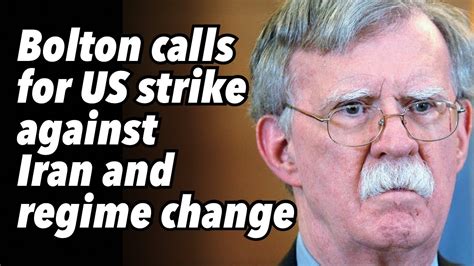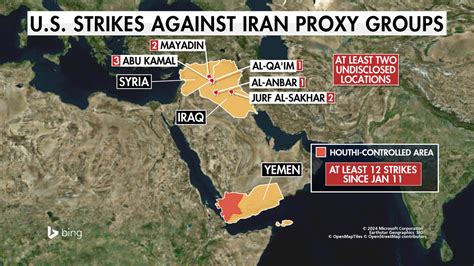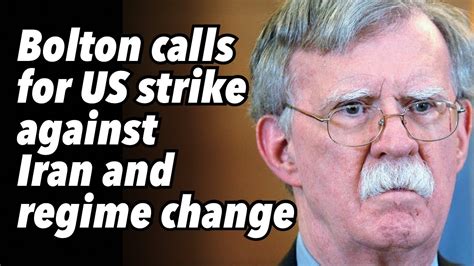
Former U.S. National Security Advisor John Bolton believes the Iranian regime is “in trouble” following recent U.S. strikes in Syria, asserting that such actions demonstrate a renewed seriousness in Washington’s approach to Tehran. Bolton, in an interview, suggested these strikes could signal a shift towards a more assertive strategy to deter Iranian aggression and destabilizing activities in the region.
John Bolton, former National Security Advisor under President Donald Trump, has asserted that the Iranian regime is “in trouble” following recent U.S. military actions in Syria. Speaking in an interview, Bolton suggested that these strikes signal a significant shift in the U.S.’s approach to Iran, potentially indicating a move towards a more assertive strategy aimed at deterring Iranian aggression and its destabilizing activities throughout the Middle East.
Bolton, known for his hawkish stance on Iran, has long advocated for a tougher U.S. policy to curb the regime’s nuclear ambitions and regional influence. He argued that the strikes, while limited in scope, send a crucial message to Tehran regarding the consequences of its actions. According to Bolton, “I think the message they need to get is that the United States is serious about deterring further Iranian aggression.” This statement reflects his longstanding belief that only strong and decisive action can effectively contain Iran’s behavior.
The U.S. military conducted these strikes in response to recent attacks on U.S. personnel in the region. The specific targets were facilities used by Iran-backed militant groups, primarily in eastern Syria. The Biden administration has stated that the strikes were intended to be proportionate and aimed at de-escalating tensions while holding Iran accountable for the actions of its proxies. However, critics argue that such actions risk further escalating the conflict and could potentially draw the U.S. deeper into regional conflicts.
Bolton emphasized that the current situation presents a critical juncture for U.S. policy toward Iran. He believes that the U.S. must leverage its military and economic power to exert maximum pressure on the regime, compelling it to change its behavior. He stated, “I think the way to deal with Iran is to demonstrate resolve and determination.” This approach contrasts with the Biden administration’s efforts to revive the Iran nuclear deal, also known as the Joint Comprehensive Plan of Action (JCPOA), which Bolton has consistently opposed.
Bolton’s perspective on the U.S.-Iran relationship is rooted in his conviction that the Iranian regime is inherently aggressive and cannot be trusted to abide by international agreements. He maintains that only a policy of “maximum pressure” can effectively constrain Iran’s nuclear ambitions and regional destabilization. The recent U.S. strikes, in his view, represent a step in the right direction, signaling a renewed commitment to confronting Iranian aggression.
The strikes in Syria have sparked a broader debate about the efficacy and implications of U.S. military actions in the region. Some analysts argue that these strikes are a necessary deterrent, preventing further attacks on U.S. forces and allies. Others caution that they risk escalating tensions and could lead to a wider conflict. The situation remains fluid, and the long-term consequences of these actions are yet to be seen.
Background on U.S.-Iran Relations
The relationship between the United States and Iran has been fraught with tension and conflict since the 1979 Iranian Revolution, which ousted the U.S.-backed Shah and established an Islamic Republic. The revolution led to a severing of diplomatic ties and a period of deep animosity between the two countries.
Over the years, numerous issues have fueled the conflict, including Iran’s nuclear program, its support for militant groups in the region, its human rights record, and its ballistic missile development. The U.S. has imposed a wide range of sanctions on Iran, aimed at curbing its nuclear ambitions and pressuring it to change its behavior.
In 2015, the U.S. and other world powers reached an agreement with Iran known as the Joint Comprehensive Plan of Action (JCPOA), which limited Iran’s nuclear program in exchange for the lifting of some sanctions. However, in 2018, President Trump withdrew the U.S. from the JCPOA and reimposed sanctions on Iran, arguing that the agreement was flawed and did not adequately address Iran’s other malign activities.
Since then, tensions between the U.S. and Iran have escalated, with several incidents involving attacks on oil tankers, drone strikes, and military confrontations. The two countries have come close to direct conflict on several occasions.
The Iran Nuclear Deal (JCPOA)
The Joint Comprehensive Plan of Action (JCPOA) was a landmark agreement reached in 2015 between Iran and the P5+1 countries (the United States, United Kingdom, France, China, and Russia, plus Germany) and the European Union. The deal aimed to prevent Iran from developing nuclear weapons by imposing strict limits on its nuclear program and subjecting it to intrusive international monitoring.
Under the JCPOA, Iran agreed to reduce its uranium enrichment capacity, eliminate its stockpile of enriched uranium, and allow inspectors from the International Atomic Energy Agency (IAEA) to access its nuclear facilities. In exchange, the P5+1 countries agreed to lift some economic sanctions on Iran.
The JCPOA was hailed as a major diplomatic achievement, but it also faced criticism from some quarters. Critics argued that the deal did not go far enough in curbing Iran’s nuclear ambitions and that it did not address Iran’s other malign activities, such as its support for terrorism and its ballistic missile program.
In 2018, President Trump withdrew the U.S. from the JCPOA, arguing that the deal was flawed and did not serve U.S. interests. He reimposed sanctions on Iran and pursued a policy of “maximum pressure” aimed at forcing Iran to negotiate a new agreement.
The Biden administration has expressed interest in reviving the JCPOA, but negotiations have been stalled due to disagreements between the U.S. and Iran over which sanctions should be lifted and how Iran should return to compliance with the deal.
The Implications of Bolton’s Statement
Bolton’s statement that the Iranian regime is “in trouble” reflects a broader assessment of the challenges facing Iran, both domestically and internationally. Iran’s economy has been struggling under the weight of U.S. sanctions, and the country has been grappling with internal unrest and political divisions.
Bolton’s remarks also suggest that he believes the recent U.S. strikes in Syria have had a significant impact on the regime’s morale and confidence. By demonstrating a willingness to use military force, the U.S. may be sending a message to Tehran that it is prepared to take a tougher stance against Iranian aggression.
However, it is important to note that Bolton’s views are not universally shared. Many analysts believe that a more cautious and diplomatic approach is needed to de-escalate tensions with Iran and prevent a wider conflict. They argue that military strikes could backfire, leading to retaliation and further instability in the region.
The Broader Regional Context
The U.S. strikes in Syria and Bolton’s comments on Iran must be viewed within the broader context of the complex and volatile Middle East. The region is facing a number of challenges, including ongoing conflicts in Syria, Yemen, and Iraq, as well as the rise of extremist groups and the growing rivalry between Iran and Saudi Arabia.
The U.S. has been playing a significant role in the region for decades, providing military and economic support to its allies and seeking to promote stability and security. However, the U.S. has also faced criticism for its involvement in regional conflicts and its support for authoritarian regimes.
The Biden administration has been seeking to recalibrate U.S. policy in the Middle East, emphasizing diplomacy and de-escalation while maintaining its commitment to regional security. However, the challenges facing the region are numerous, and the U.S. will need to navigate a complex and evolving landscape.
The Future of U.S.-Iran Relations
The future of U.S.-Iran relations remains uncertain. While the Biden administration has expressed interest in reviving the JCPOA, negotiations have been stalled, and significant obstacles remain. The two countries continue to be at odds over a range of issues, and the risk of escalation remains high.
It is possible that the U.S. and Iran could eventually find a way to coexist peacefully, but this would require a significant shift in attitudes and policies on both sides. In the meantime, the relationship is likely to remain tense and volatile, with the potential for further conflict.
The Role of International Diplomacy
International diplomacy will play a crucial role in shaping the future of U.S.-Iran relations. The involvement of other countries, such as the UK, France, Germany, China, and Russia, could help to de-escalate tensions and facilitate dialogue between the U.S. and Iran.
The European Union has been particularly active in trying to revive the JCPOA, and it could play a key role in mediating between the U.S. and Iran. However, the success of any diplomatic efforts will depend on the willingness of both sides to compromise and engage in good-faith negotiations.
Expert Analysis and Commentary
Experts and analysts have offered a range of perspectives on the U.S. strikes in Syria and their implications for U.S.-Iran relations. Some experts have argued that the strikes were a necessary deterrent, while others have cautioned that they could escalate tensions.
Many experts have also emphasized the importance of diplomacy and dialogue in resolving the conflict between the U.S. and Iran. They argue that a military solution is not possible and that a negotiated settlement is the only way to achieve long-term stability in the region.
Conclusion
John Bolton’s assertion that the Iranian regime is “in trouble” reflects a complex and evolving situation in the Middle East. The recent U.S. strikes in Syria have added another layer of complexity to the already fraught relationship between the U.S. and Iran.
The future of U.S.-Iran relations remains uncertain, but it is clear that international diplomacy will play a crucial role in shaping the outcome. The U.S. and Iran must find a way to de-escalate tensions and engage in dialogue if they are to avoid a wider conflict. The stakes are high, and the consequences of failure could be catastrophic for the region and the world.
The international community will be watching closely as the situation unfolds, hoping for a peaceful resolution to the conflict and a more stable and secure Middle East. The path forward is challenging, but it is essential that all parties involved work together to find a way to coexist peacefully and address the underlying issues that have fueled the conflict for so long. Only through sustained diplomatic efforts and a commitment to dialogue can the U.S. and Iran hope to build a more constructive and peaceful relationship in the future. The alternative is a continuation of the cycle of violence and instability that has plagued the region for decades.
In-depth Analysis of Bolton’s Perspective
John Bolton’s perspective on Iran is deeply rooted in his long-standing belief that the regime is inherently untrustworthy and expansionist. His worldview is shaped by a conviction that only unwavering strength and resolve can deter Iran from pursuing its nuclear ambitions and engaging in destabilizing activities. Bolton’s hawkish stance is often characterized by a skepticism towards diplomacy and a preference for coercive measures, including military force.
Bolton’s assessment that the Iranian regime is “in trouble” stems from several factors, including the economic pressures imposed by U.S. sanctions, internal dissent within Iran, and the perceived impact of recent U.S. military actions. He likely believes that these factors, combined with a more assertive U.S. posture, could create an opportunity to weaken the regime and compel it to change its behavior.
However, Bolton’s perspective is not without its critics. Some analysts argue that his hardline approach could backfire, leading to escalation and further instability. They contend that a more nuanced and diplomatic approach is necessary to address the complex challenges posed by Iran.
The Role of U.S. Foreign Policy
U.S. foreign policy toward Iran has been a subject of intense debate for decades. Different administrations have pursued different strategies, ranging from engagement and diplomacy to containment and confrontation.
The Obama administration pursued a policy of engagement with Iran, culminating in the JCPOA. The Trump administration, on the other hand, adopted a policy of “maximum pressure,” withdrawing from the JCPOA and imposing sanctions on Iran. The Biden administration has expressed interest in reviving the JCPOA, but negotiations have been stalled.
The effectiveness of these different approaches is a matter of ongoing debate. Some argue that engagement can lead to positive change, while others believe that only pressure can compel Iran to alter its behavior. The choice of strategy will have significant implications for the future of U.S.-Iran relations and the stability of the Middle East.
Geopolitical Considerations
The conflict between the U.S. and Iran is not just a bilateral issue. It is deeply intertwined with the broader geopolitical dynamics of the Middle East. Iran is a major regional power with close ties to several countries and non-state actors.
The rivalry between Iran and Saudi Arabia is a key factor in the region. The two countries are competing for influence in several countries, including Syria, Yemen, and Iraq. The U.S. has traditionally aligned itself with Saudi Arabia, but it has also sought to maintain some degree of communication with Iran.
The rise of extremist groups, such as ISIS, has further complicated the situation. The U.S. and Iran have both fought against ISIS, but they have also been on opposite sides of other conflicts in the region.
The Importance of Regional Stability
Regional stability is essential for the security and prosperity of the Middle East and the world. The ongoing conflicts and tensions in the region have had devastating consequences, including humanitarian crises, economic disruption, and the spread of terrorism.
The U.S. has a strong interest in promoting regional stability, but it faces a number of challenges in doing so. The region is deeply divided, and there are many competing interests. The U.S. must work with its allies and partners to address the underlying causes of instability and promote a more peaceful and prosperous future for the Middle East.
The Need for a Comprehensive Strategy
Addressing the challenges posed by Iran requires a comprehensive strategy that integrates diplomacy, economic pressure, and military deterrence. A purely military approach is unlikely to be successful and could lead to unintended consequences.
The U.S. must work with its allies and partners to build a united front against Iranian aggression. It must also be prepared to engage in dialogue with Iran, but only if Iran is willing to negotiate in good faith. The ultimate goal should be to achieve a stable and secure Middle East, where all countries can coexist peacefully.
The Economic Impact of Sanctions
U.S. sanctions have had a significant impact on the Iranian economy. The sanctions have restricted Iran’s ability to export oil, access international financial markets, and conduct trade. As a result, Iran’s economy has contracted, and its currency has depreciated.
The sanctions have also led to shortages of essential goods and services, causing hardship for ordinary Iranians. However, the sanctions have not yet achieved their intended goal of forcing Iran to change its behavior.
Some analysts argue that the sanctions are counterproductive, as they have led to increased resentment towards the U.S. and have made it more difficult for moderate voices within Iran to be heard. Others argue that the sanctions are necessary to pressure Iran to abandon its nuclear ambitions and cease its destabilizing activities.
The Human Rights Situation in Iran
The human rights situation in Iran is a matter of serious concern. The Iranian government has been accused of widespread human rights abuses, including arbitrary arrests, torture, and executions.
The government has also been criticized for restricting freedom of speech, assembly, and religion. The human rights situation in Iran has deteriorated in recent years, and there is little hope for improvement in the near future.
The U.S. has repeatedly condemned Iran’s human rights record and has called on the government to respect the rights of its citizens. However, these calls have had little impact, and the human rights situation in Iran remains dire.
FAQ Section:
1. What was the primary reason for the US strikes in Syria mentioned in the article?
The U.S. strikes in Syria were conducted in response to recent attacks on U.S. personnel in the region by Iran-backed militant groups.
2. What is John Bolton’s general stance on the Iranian regime and how does he believe the US should handle it?
Bolton is known for his hawkish stance and believes the Iranian regime is inherently aggressive and untrustworthy. He advocates for a policy of “maximum pressure” and strong, decisive action, including the use of military force, to deter Iranian aggression and curb its nuclear ambitions.
3. What are some of the criticisms of Bolton’s views on Iran?
Some critics argue that Bolton’s hardline approach could escalate tensions and destabilize the region further, and that a more nuanced and diplomatic strategy is needed.
4. What is the JCPOA and what is its current status?
The JCPOA (Joint Comprehensive Plan of Action) is the Iran nuclear deal reached in 2015. Under the agreement, Iran agreed to limit its nuclear program in exchange for the lifting of some sanctions. The U.S. withdrew from the JCPOA in 2018 under President Trump, but the Biden administration has expressed interest in reviving it, although negotiations have stalled.
5. What are some of the key issues that have historically caused tensions between the US and Iran?
Key issues include Iran’s nuclear program, its support for militant groups in the Middle East, its human rights record, and its ballistic missile development.









